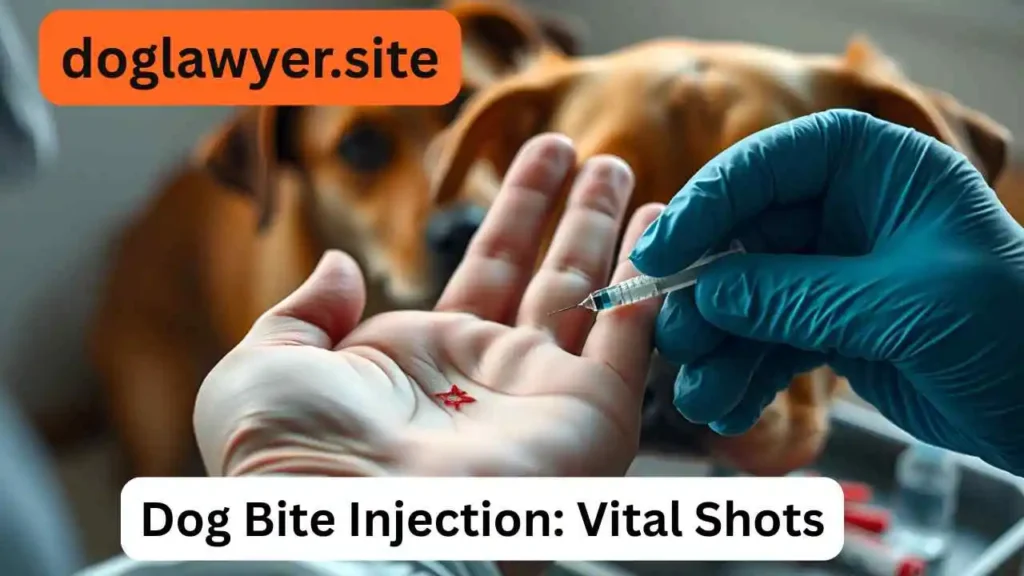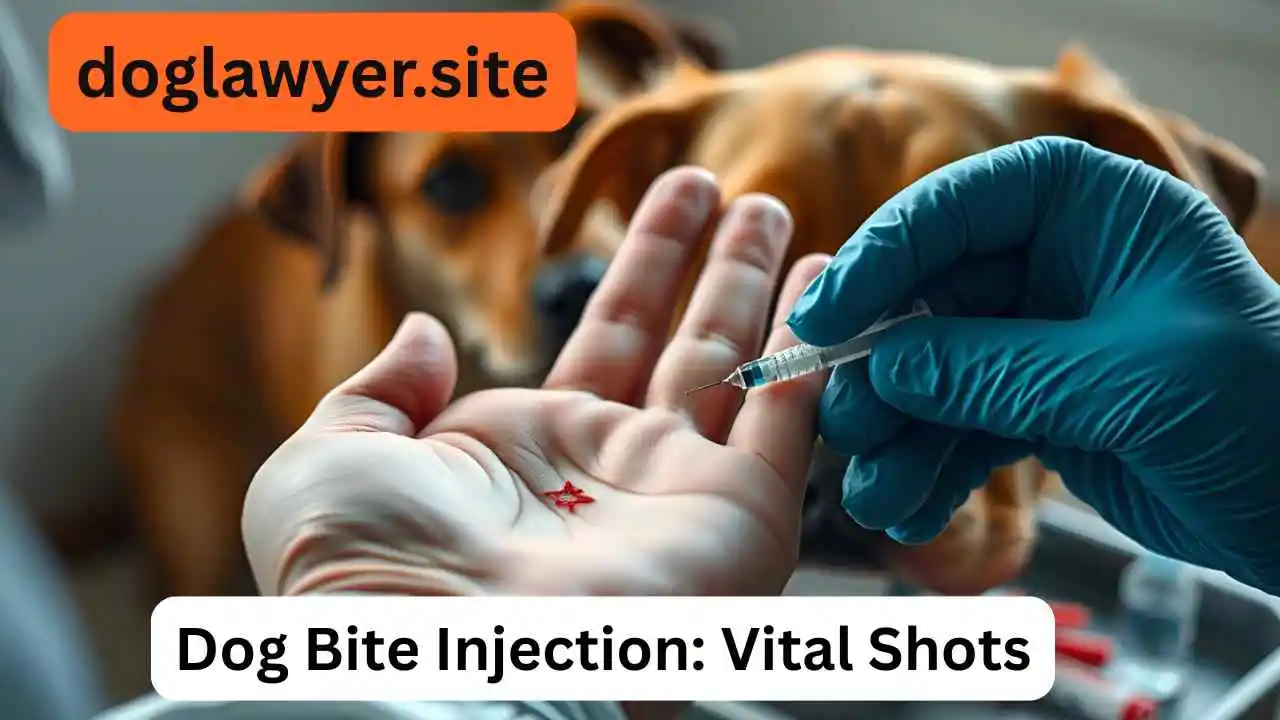Dog bites may appear to be minor injuries, but if treatment is delayed, they can quickly worsen and become life-threatening. Injecting a dog bite helps avoid fatal illnesses like tetanus and rabies in addition to relieving pain.
Nearly 800,000 of the more than 4.5 million Americans who are bitten by dogs each year need medical attention. This is not just a pet problem—it’s a public health concern.
Understanding what injections are needed, when to get them, and what symptoms to watch out for can make all the difference.
Table of Contents
Dog Bite Injection: Vital Shots
🚑 Immediate Actions After a Dog Bite
Time is of the essence after a bite. Acting fast can reduce your risk of complications dramatically.
🧼 Wash the Wound Properly
Before anything else:
- Rinse the wound with warm water and mild soap for at least 10-15 minutes.
- Don’t scrub vigorously—gentle cleaning avoids further damage.
- Apply an antiseptic (like iodine or hydrogen peroxide).
🩺 Seek Medical Attention Promptly
Even if the bite looks minor:
- Visit a healthcare provider within 24 hours.
- Small punctures can still harbor bacteria.
- Medical professionals will assess if a dog bite injection is required.
🧫 Understanding Dog Bite Infections
Dogs’ mouths carry over 60 types of bacteria. Some bites introduce pathogens that can be dangerous—even fatal—if left untreated.
🔍 Signs of Infections
During the first 48 hours, keep an eye out for these symptoms:
- Swelling, redness, or warmth
- Pus or discharge
- Fever or chills
- Throbbing pain

⚠️ Risk Factors for Severe Complications
You’re more vulnerable if you:
- Are immunocompromised
- Have diabetes
- Were bitten on hands, feet, or face
- Delay treatment
💉 The Role of Dog Bite Injections
Not every bite needs an injection—but many do. Here’s a breakdown.
🦠 What Is a Rabies Injection?
Rabies is a deadly viral disease. If the dog’s vaccination status is unknown, or it was a stray, you’ll likely need a rabies post-exposure prophylaxis (PEP) series.
💉 When Tetanus Shots Are Required
Tetanus bacteria can enter through deep wounds or punctures.
You’ll need a tetanus booster if:
- You haven’t had one in the last 5 years
- The bite was particularly dirty or deep
💊 Antibiotic Injections and Preventive Measures
Doctors may prescribe injectable antibiotics or oral meds to stop infection early.
Common antibiotics include:
- Amoxicillin-clavulanate
- Doxycycline (for penicillin allergies)
📆 Rabies Post-Exposure Prophylaxis (PEP) Protocol
This is a lifesaving treatment—timing is crucial.
🗓️ Day-by-Day Injection Schedule
- Day 0 – Rabies immune globulin + First vaccine
- Day 3 – Second vaccine
- Day 7 – Third vaccine
- Day 14 – Final vaccine
Some may require a fifth dose on Day 28, depending on immune status.
💸 Cost of Rabies Injection
The price in the United States varies from $1,200 to $6,500, contingent on:
- Healthcare provider
- Number of doses
- Insurance coverage
😨 Are Dog Bites Always Dangerous?
No, but caution is still necessary.
🩹 Minor vs. Severe Bites
- Minor: Superficial scratches or nicks may need only cleaning and observation.
- Severe: Deep wounds, torn skin, or excessive bleeding require injections and possible stitches.
🐕 Wild vs. Domestic Dog Risks
- Modernly vaccinated domestic dogs are less dangerous.
- Stray or wild dogs should always be treated as high-risk.
👶 Children and Dog Bite Injection Necessity
Biting injuries to the head, neck, or face are more common in children under ten. These regions are more prone to infection and deformity.
Pediatric care providers almost always recommend:
- Rabies shots (if status is unknown)
- Tetanus boosters
- Close monitoring for infection
🌍 Dog Bite Cases in the U.S. and Worldwide
📊 Alarming Statistics
- Over 25,000 post-exposure treatments are given annually in the U.S.
- India estimates more than 20,000 rabies deaths annually, many of which are brought on by dog attacks.
🗺️ High-Risk Regions
Countries with large stray dog populations (India, Philippines, parts of Africa) have the highest rabies risk.
⚖️ Legal and Insurance Aspects of Dog Bites
💵 Who Pays for Treatment?
Usually:
- Homeowners’ insurance covers dog bite liability.
- Some health insurance plans cover PEP costs.
🧾 Reporting and Legal Action
In most U.S. states:
- Local animal control must be notified about dog bites.
- Victims may sue for damages like medical costs and pain and suffering.
🚫 How to Prevent Dog Bites
🧍 Tips for Adults
- Don’t approach unfamiliar dogs.
- Avoid eye contact with aggressive dogs.
- Never disturb a dog that’s eating or sleeping.
🧒 Teaching Children Safety Around Dogs
- Instruct them to “be a tree” in the event that a dog comes near.
- Always ask the owner before petting.
- Avoid running past dogs or teasing them.
🧠 Myths and Facts About Dog Bite Injections
| Myth | Truth |
|---|---|
| Rabies only comes from wild animals | Dogs are a major rabies carrier worldwide |
| A small bite doesn’t need treatment | Even minor bites can get infected |
| Vaccinated dogs can’t spread rabies | Rare, but still possible |
| You can wait a few days for a rabies shot | Delay increases risk drastically |
🛡️ Dog Bite Prevention Tips
👨👩👧 For Adults:
- Steer clear of unknown dogs: If a dog isn’t with its owner, avoid approaching it.
- Watch body language – Growling, baring teeth, stiff posture, or ears back are signs a dog may bite.
- Don’t disturb dogs – Avoid waking or surprising a sleeping dog, or bothering one while it’s eating or caring for puppies.
- Let the dog sniff you first – Allow the dog to approach you and sniff before petting.
- Don’t run from a dog – Running may trigger a chase instinct.
- Stay calm and still – If an aggressive dog approaches, stand still like a tree and avoid eye contact.
- Never try to break up a dog fight – Use a loud noise or water, not your hands.
🧒 For Children:
- Always ask permission – Teach kids to ask the dog’s owner before petting.
- Do not poke, pull ears or tails, or engage in rough play with dogs.
- Avoid hugging dogs because many of them don’t like to be in close proximity to people.
- Never approach a dog tied up or behind a fence – Dogs can feel trapped and react aggressively.
- Walk calmly past dogs – Running, screaming, or flailing arms can provoke a bite.
🐾 General Pet Safety:
- Early socialization involves exposing your dog to both people and other animals in a constructive manner.
- Train obedience commands – “Sit,” “stay,” and “leave it” can prevent bites.
- Keep vaccinations up to date – Protects both your dog and others.
- Use a leash in public – It gives you control and prevents unwanted interactions.
⚠️ Signs a Dog Might Bite Soon
🐶 Body Language and Behavior:
- Growling or Snarling
- Low, rumbling growls or showing teeth are clear signs of discomfort or aggression.
- Stiff Body Posture
- A tense, rigid body often signals that the dog feels threatened or ready to react.
- Raised Fur (Hackles)
- When hair stands up along the neck or back, it indicates that the dog is extremely vigilant.
- Pinned-Back Ears
- Ears pressed tightly against the head can indicate fear or defensiveness.
- Hard Stare or Intense Eye Contact
- A fixed, unblinking stare is a sign of a possible upcoming bite.
- Yawning, Lip Licking, or Panting
- These may look harmless, but they can be signs of stress and growing agitation.
- Tail Position
- A tail held high and rigid, or tucked tightly under the body, suggests unease.
- Backing Away or Trying to Escape
- If cornered, a scared dog may resort to biting if it feels there’s no way out.
- Sudden Freezing
- A dog that suddenly stops moving may be making a decision—fight or flight. Freezing often precedes a bite.
- Snapping or Lunging (Even Without Contact)
- These are very serious warnings that a bite may be next.
🔑 Key Tip:
Never ignore early warning signs. Most dogs don’t bite “out of nowhere”—they often give subtle clues first. Respect their space and act calmly.
❓ FAQs
1. What injection is needed for a dog bite?
Usually, rabies and tetanus injections, depending on the severity and the dog’s vaccination history.
2. How soon should I get a dog bite injection?
Immediately. Rabies PEP is most effective when started within 24 hours.
3. Are antibiotics always necessary?
Not always, but doctors often prescribe them to prevent bacterial infections.
4. What happens if I skip the rabies injection?
You risk a 100% fatal disease. Rabies is not treatable once symptoms begin.
5. Can I get rabies from a vaccinated dog?
It’s rare, but possible if the vaccine wasn’t up-to-date or properly administered.
6. How do I know if a bite is serious?
If it’s deep, bleeding a lot, or near the face/hands, seek immediate care and expect injections.
✅ Conclusion: Fast Action Saves Lives
Dog bites aren’t just painful—they can be deadly without the right treatment. The dog bite injection, particularly rabies and tetanus, can mean the difference between a full recovery and a medical emergency.
Whether the bite seems small or not, don’t risk it. Act fast, clean the wound, seek medical advice, and stay informed.
Read More
Can You Get Tetanus from Dog Bite?


